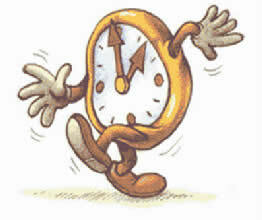As soon as we started the first grades of elementary school, we got in contact with reading and writing, we acquired our first knowledge and, when we already have some intimacy with the lyrics, we are introduced to the verbs and their verb tenses.
We've all learned that verbs are conjugated in the following tenses: past, present and future. We also learned that verbs, when conjugated in the past tense, can be in the past tense, past tense perfect and past tense more-than-perfect. These divisions of the past tense often generate doubts, as we do not always know how to classify verbs properly. So, let's get to the explanation.
First question: Why the more-than-perfect past tense have that name? Is it because he's more perfect than the others? The answer is no. The past tense more-than-perfect is more-than-perfect because it indicates an action from the past that happened before past tense. In the past perfect tense, the action takes place in a past point in time. Look at the examples:
|
The ball entered when the referee whistled. (past tense) When the referee whistled, the ball had already entered. (more-than-perfect past tense = the ball already had entered). When the teacher began the explanation, Ana arrived. (past tense) When Ana arrived, the teacher had already started the explanation. (more-than-perfect past tense = had already started). |
The perfect past tense indicates a certain moment in the past: “... the referee whistled”.
O more-than-perfect past tense indicates a moment before the perfect past tense: “... the ball had already entered."
Note an example of the use of the more-than-perfect past tense in the lyrics of the song “Superman – A song”:
|
... who gave, could every man understand Oh! Mom, I wish... My portion woman who until then guard... |
protect, a verb taken from the lyrics of the song, can be replaced by the verb phrase “he had taken shelter”, and this is usually what we do in speech and writing. Have you ever noticed that we avoid using the more-than-perfect past tense? When we want to refer to a tense before the perfect past tense, we prefer to use a phrase corresponding verbal and this happens because we are in doubt about how to conjugate the verb properly. The use of the more-than-perfect past tense is usually restricted to formal texts, we can often find it also in literary language. I hope you learned more about this very peculiar tense!
By Luana Castro
Graduated in Letters


